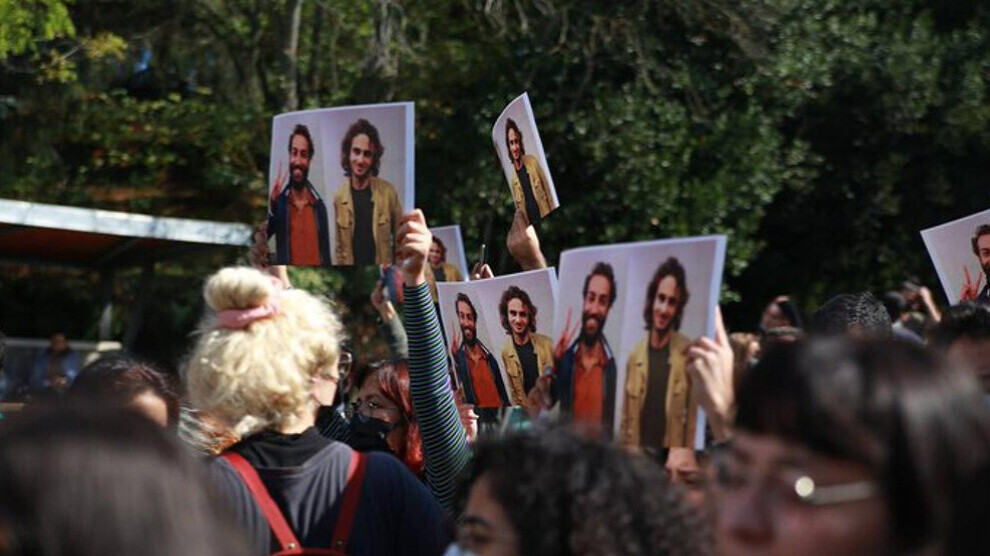Boğaziçi University students released from pre-trial detention
Students Enis Berke Gök and Caner Perit Özen, charged with protesting against the appointed rector of Istanbul's Boğaziçi University, are released from pre-trial detention.
Students Enis Berke Gök and Caner Perit Özen, charged with protesting against the appointed rector of Istanbul's Boğaziçi University, are released from pre-trial detention.

Students Enis Berke Gök and Caner Perit Özen, charged with protesting against the appointed rector of Istanbul's Boğaziçi University, will be released from pre-trial detention. At today's start of the trial before the 22nd Criminal Chamber of Istanbul District Court, the arrest warrants against the two students were lifted in exchange for the imposition of police registration orders. A date for the next day of the trial has not yet been announced by the court. During the trial, a rally in solidarity with the defendants took place in front of the Çağlayan Palace of Justice, with the participation of students, academics, politicians and civil society activists. There was a call to expand the resistance for university autonomy.
Enis Berke Gök and Caner Perit Özen had been in pre-trial detention for three months. The prosecution accuses them and twelve other students of violating the Turkish Assembly Law number 2911, resisting state authority, insulting and causing damage to a university official vehicle, which, according to the prosecution, amounts to the equivalent of about 50 euros. The students allegedly took part in a protest against the appointment of Naci Inci as rector of the prestigious university by President Recep Tayyip Erdoğan on 5 October 2021. Inci was appointed head of Boğaziçi University in August after the removal of the also appointed rector, Melih Bulu. As a "trustee of the regime", he is rejected not only by the students but also by 95 per cent of the academic staff. The arrests of Gök and Özen followed an insult complaint filed by Inci against all fourteen defendants.
Gök and Özen were not personally present in the courtroom at the start of the trial as they were connected via the SEGBIS video-conferencing system. Both students vehemently denied the accusations against them. Enis Berke Gök was the first to take the floor and described in detail the circumstances of his arrest. "Shortly before I left the classroom building that day, a link was sent to my mobile phone. The link led to a report from the official news agency Anadolu. The content was about our defamation by President Recep Tayyip Erdoğan, who had put us on a hit list. Immediately afterwards, I was called and informed of my imminent arrest. The plainclothes police officers located on the university campus followed me at that point. As I left the building I was arrested by the waiting riot police."
Gök further mentioned in his defence speech that he had been a victim of violence and abuse in police custody. "In detention we are dealing with another facet of fascism. This is embodied in actions such as fisticuffs, orders to obey, refusal to give out food and hot water, confiscation of books, delayed release of lecture notes, prevented attendance at lectures, unheeded requests and confiscated letters," the student highlighted.
Caner Perit Özen told the court that the only reason the two ended up behind bars was because of their support for the resistance at Boğaziçi University. He described the repression against the students as a "state in which evil has become commonplace" and, in this context, recalled a statement made by the rector Naci Inci, who had called the students "vandals" on a TV programme. "The real vandal is Inci himself. But it would be fatal to call us just a group of poor students who have been robbed of their right to education. Because we are struggling students who are leading a resistance. Let no one think that we will kowtow to anyone like the trustees themselves do. There is no such person."
Özen and Gök now have to report regularly to a police station. The basis of the measure, which is called a "preventive measure", is the law on "release under judicial control", which came into force in 2013. The mechanism is considered an alternative to imprisonment and is used excessively by the Turkish judiciary to keep undesirable people under control. People from the HDP and civil society are particularly affected.